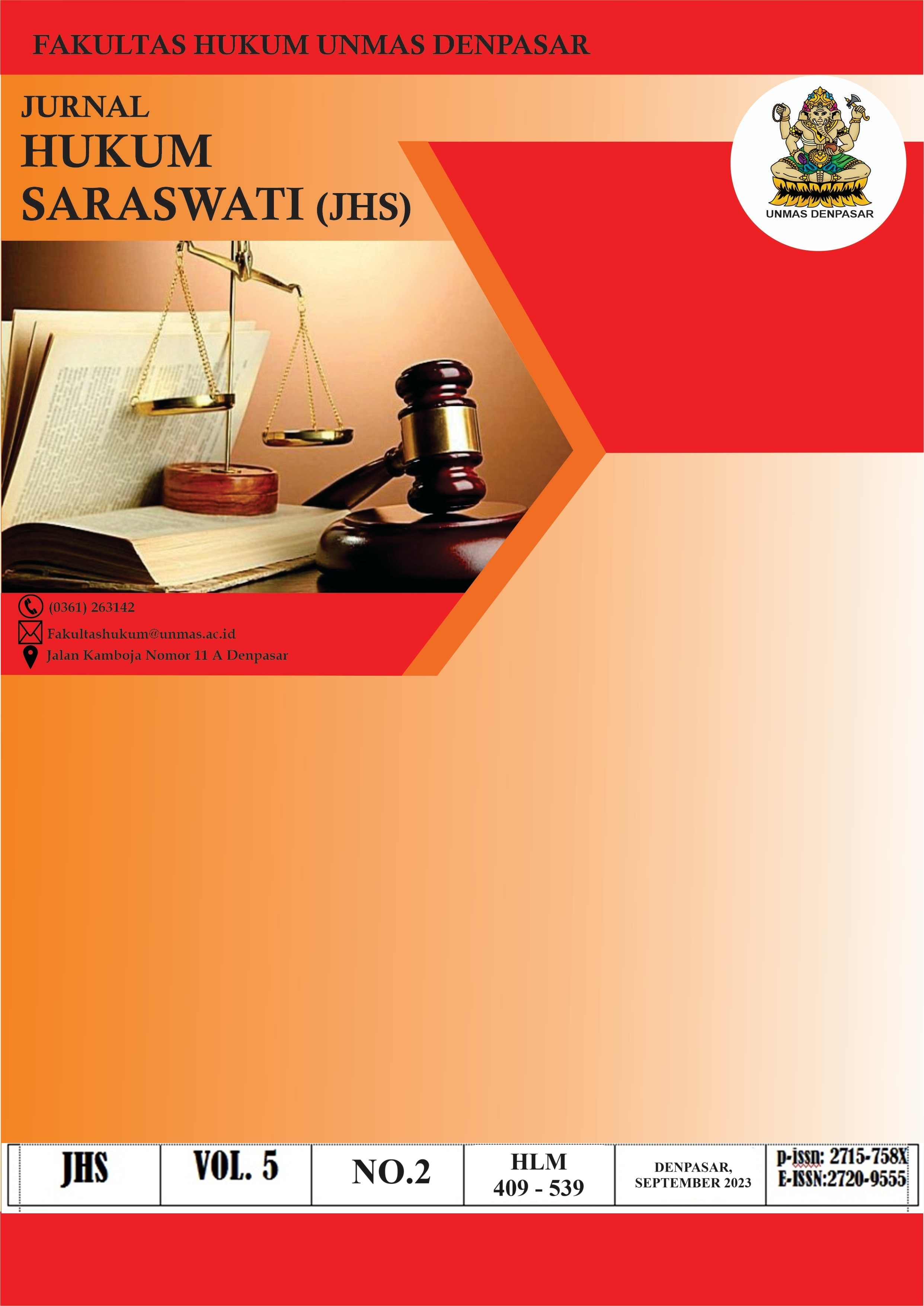ANALISIS SANKSI HUKUM ATAS PERTANGGUNGJAWABAN PEMERINTAH TERHADAP INSIDEN BOCORNYA DATA PRIBADI MASYARAKAT DARI PUSAT DATA NASIONAL (PDN) INDONESIA
Keywords:
Data Protection, Sanctions, Government, Responsibility.Abstract
The concept of legal responsibility is related to legal obligations, which means that a person is legally responsible for their actions and can be subject to sanctions if their actions conflict with their obligations. The term governmental liability is a form of accountability resulting from government actions that violate the law. One of the things that the government must be held accountable for is the failure to protect the personal data of Indonesian citizens in the incident where the National Data Center was breached due to a weak national defense system. This research discusses legal sanctions that can be applied to the government and the implications of these sanctions in the world of law in Indonesia. The methodology that researchers use is a normative legal research methodology with a statutory and regulatory approach, where the results are presented using analytical descriptive techniques. The aim of this research is to find new legal facts in the field of data protection. It can be concluded that the sanctions imposed within the scope of government office responsibilities for failure to protect personal data are in the form of administrative sanctions or civil sanctions, while from the perspective of personal responsibility they can be in the form of administrative sanctions or civil or criminal sanctions. The existence of legal sanctions for protecting personal data (UU PDP, UU ITE) has created a definite legal atmosphere, but these regulations have not been effective in preventing the onslaught of various types of multi-diverse risks in the cyber world
References
Jurnal
Panjaitan, Budi Sastra. 2019. Bantuan Hukum Sebagai Sarana dalam Mewujudkan Keadilan. DOKTRINA: JOURNAL OF LAW April (2019) 2 (1): 46.
Sulistyowati, 2009, “Refleksi Metodologis: Penelitian Sosiolegal” dalam Metode Penelitian Hukum Konstelasi Dan Refleksi, Sulistyowati Irianto & Shidarta (Ed), Edisi Pertama, Yayasan Obor Indonesia, Jakarta
Syafi’ie, M. 2012. Instrumentasi Hukum HAM, Pembentukan Lembaga Perlindungan HAM di Indonesia dan Peran Mahkamah Konstitusi. Jurnal Konstitusi 9 (4): 683.
Susanto, S. N. H. (2019). Karakter Yuridis Sanksi Hukum Administrasi: Suatu Pendekatan Komparasi. Administrative Law and Governance Journal, 2(1), 126-142. https://doi.org/10.14710/alj.v2i1.126-142.
Yuniarti, S. (2019). Perlindungan hukum data pribadi di Indonesia. Business Economic, Communication, and Social Sciences Journal (BECOSS), 1(1), 147-154. DOI: https://doi.org/10.21512/becossjournal.v1i1.6030.
Furqania, Mriya Afifah, dan Ahmad Sholikhin Ruslie. "Tanggung Gugat Pemerintah Dalam Perlindungan Data Pribadi." Bureaucracy Journal: Indonesia Journal of Law and Social-Political Governance 3.1 (2023): 482-493. Doi: 10.53363/bureau.v3i1.195.
Sudirman, M., dkk. (2024). Menganalisis Penanganan Kebocoran Data Pengguna Facebook Dalam Konteks Manajemen Sekuriti. Jurnal Portofolio: Jurnal Manajemen dan Bisnis, 3(3), 255-268.
Skripsi/Tesis
Dirgantara Muhammad, 2023.“Pertanggungjawaban Hukum PT. Tokopedia Terhadap Kebocoran Data Pribadi”. Skripsi Program Studi Hukum Tata Negara (Siyasah) Fakultas Syariah Institut Agama Islam Negeri (IAIN) Palopo. Hlm, 69.
Ahmad, Muflihun. (2023). Tanggung Jawab Hukum Pengendali Data Pribadi Jika Terjadi Kebocoran Data Berdasarkan Undang-Undang Nomor 27 Tahun 2022 Tentang Pelindungan Data Pribadi. Skripsi. Fakultas Hukum Universitas Lampung. Hlm, 7.
Wijaya, Sandra. (2021). Pertanggung Jawaban Pidana Korporasi Penyedia Layanan Teknologi Informasi Elektronik Berbasis Web Dan Aplikasi Atas Adanya Kebocoran Data Pribadi Pengguna. Tesis. Universitas Islam Indonesia. Hlm, 50.
Internet
Badan Pengembangan dan Pembinaan Bahasa, Kementerian Pendidikan, Kebudayaan, Riset, dan Teknologi Republik Indonesia. Kamus Besar Bahasa Indonesia (KBBI) Daring. https://kbbi.kemdikbud.go.id/Beranda. Diakses Pada 27 Agustus 2024.
Viriya Singgih. Petinggi Kominfo mundur 'sebagai tanggung jawab moral' setelah Pusat Data Nasional diretas. 2024. BBC News Indonesia. https://www.bbc.com/indonesia/articles/c8vdmymmynzo. Diakses pada 1 September 2024.
Peraturan Perundang-Undangan
Undang-Undang Dasar Negara Republik Indonesia Tahun 1945.
Majelis Umum PBB. Deklarasi Umum Hak Asasi Manusia Tahun 1948.
Regulation (EU) 2016/679 (General Data Protection Regulation). https://gdpr-info.eu/. Diakses pada 27 Agustus 2024.
Pemerintah Pusat. Undang-Undang (UU) Nomor 27 Tahun 2022 tentang Pelindungan Data Pribadi. Jakarta. 2022.
Pemerintah Pusat. Peraturan Presiden Republik Indonesia Nomor 95 Tahun 2018 tentang Sistem Pemerintahan Berbasis Elektronik (SPBE). Jakarta. 2018.
Pemerintah Pusat. Peraturan Presiden (Perpres) Nomor 95 Tahun 2018 tentang Sistem Pemerintahan Berbasis Elektronik. Jakarta. 2018.
United Nations Human Rights. 1966. International Covenant on Civil and Political Rights. General Assembly resolution 2200A (XXI). https://www.ohchr.org/en/instruments-mechanisms/instruments/international-covenant-civil-and-political-rights. Diakses pada 2 September 2024.
Pemerintah Pusat. Undang-Undang (UU) Nomor 24 Tahun 2013 tentang Perubahan atas Undang-Undang Nomor 23 Tahun 2006 tentang Administrasi Kependudukan. Jakarta. 2013.
Pemerintah Pusat. Undang-Undang (UU) Nomor 1 Tahun 2024 tentang Perubahan Kedua atas Undang-Undang Nomor 11 Tahun 2008 tentang Informasi dan Transaksi Elektronik. Jakarta. 2024.
Kitab Undang-Undang Hukum Perdata.
Downloads
Published
How to Cite
Issue
Section
License
- Copyright notice
Authors who publish with this journal agree to the following terms:
- Authors retain copyright and grant the journal right of first publication with the work simultaneously licensed under aCreative Commons Attribution License that allows others to share the work with an acknowledgement of the work's authorship and initial publication in this journal.
- Authors are able to enter into separate, additional contractual arrangements for the non-exclusive distribution of the journal's published version of the work (e.g., post it to an institutional repository or publish it in a book), with an acknowledgement of its initial publication in this journal.
- Authors are permitted and encouraged to post their work online (e.g., in institutional repositories or on their website) prior to and during the submission process, as it can lead to productive exchanges, as well as earlier and greater citation of published work (See The Effect of Open Access).







